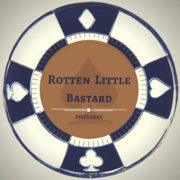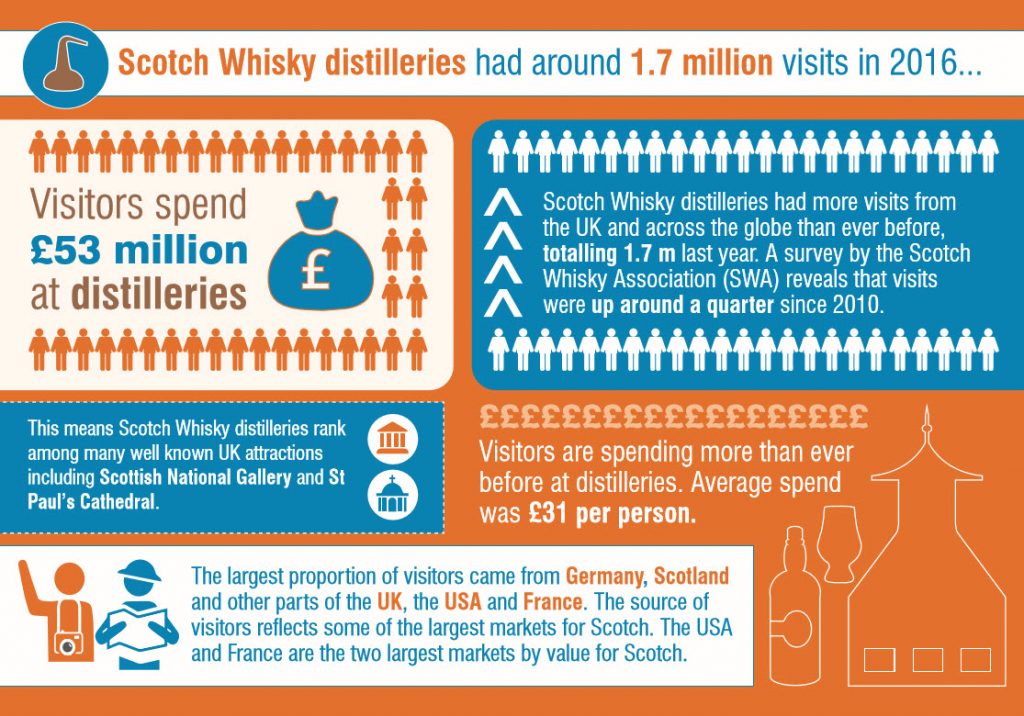
Scotch as we know it today, has been around since 1494 according to the Scotch Whisky Association. Recent figures released by the Association show that the world’s thirst for Scotch knowledge is on the upswing as visits to Scotland’s distilleries were up 8% last year to a record 1.7 million visitors. Not too shabby for a spirit that’s been around for more than five centuries.
The Scotch Whisky Association’s latest annual survey found that distillery visits have increased by around 25% since 2010 and more than half of Scotland’s 123 Scotch Whisky distilleries now welcome members of the public. (Sounds like there’s lots of opportunity for growth here.)
Visitors are also spending more than before at distilleries. A total of almost £53 million was spent by visitors in 2016, up from the previous year. And average spend per person increased 13% to £31 from £27.

Collectively, Scotch Whisky distilleries rank among some of the most popular Scottish and UK attractions, with a similar number of visits annually to the likes of St Paul’s Cathedral, the Royal Albert Hall and the Scottish National Gallery.
In the short term, many distilleries believe that Brexit has given tourism a boost with more visitors coming to Scotland because of the weak pound and spending more at distilleries while they are there. But the longer-term impact of Brexit is not yet clear.
Stay Informed: Sign up here for the Distillery Trail free email newsletter and be the first to get all the latest news, trends, job listings and events in your inbox.
Over the last year, distilleries have invested money on new bar areas, staff, technology, such as apps for visitors, and staff, partly as a result of longer opening hours to meet demand. Over the next 12 months, many plan to continue to invest, for example in upgrading shops and tasting areas to enhance the visitor experience.
Distilleries reported that the largest proportion of visitors came from Germany, Scotland and other parts of the UK, the USA, and France. Distilleries are also popular with whisky enthusiasts from Sweden and Norway. The success of whisky festivals, such as Islay and Speyside, are also helping to attract new visitors to distilleries.
“These figures are certainly good news, showing the esteem with which Scotch whisky is held around the world and the value of the whisky industry to Scotland, beyond simply revenue generated by sales and exports,” says Scotland’s Tourism Secretary Fiona Hyslop. “With further enhancements to the visitor experience at distilleries around Scotland, the Scotch whisky industry can continue to generate interest among domestic and international audiences.
The Scottish Year of History, Heritage and Archaeology
The current Scottish Year of History, Heritage and Archaeology is likely to give a further boost to visitor numbers as Scotch Whisky is a key part of Scotland’s past and its present.
According to Malcolm Roughead, Chief Executive of VisitScotland, “Whisky is one of Scotland’s most valuable commodities with people from all over the world coming to our shores to experience an authentic Scottish dram. A culinary icon, it remains as important as ever to the tourism industry with one in five visitors making a trip to a whisky distillery during their stay and even more visiting a bar, pub or restaurant to sample our renowned national drink.
“The success of Scotland’s whisky distilleries is particularly apt as we celebrate the Year of History, Heritage and Archaeology. From World Heritage Sites to ancient monuments, cultural traditions to our myths, stories and legends – the yearlong programme is shining a spotlight on some of Scotland’s greatest assets as well as our hidden gems.”
Do You Have Irish Blood Flowing Through Your Veins?
You may have Scotch whisky flowing through you veins but, have you ever wondered if your love for Scotch was something you were born with? If you are planning a trip to Scotland, this handy slideshow will help you discover your family roots as you walk in the footsteps of your forebears.
http://ebooks.visitscotland.com/441153
Cut the 80% Whisky Excise Tax
Betts say one thing that would help tourism to Scotland’s distilleries to grow would be a reduction in the excise tax. “A welcome further boost to the whisky industry during this time of change would be to see a cut in excise duty in the UK autumn budget. The high 80% tax burden on an average priced bottle of whisky means that foreign visitors often pay more tax for Scotch in Scotland than in their own countries. That can’t be the right way to encourage more visitors and to support an industry that plays such an important role in the economy, tourism and local communities.”
Source – The findings are based on a survey of a sample of distillery visitor centers by the Scotch Whisky Association. Figures represent paying customers to industry visitor centers in 2016.
Please help to support Distillery Trail. Sign up for our Newsletter, like us on Facebook and follow us on Twitter.















